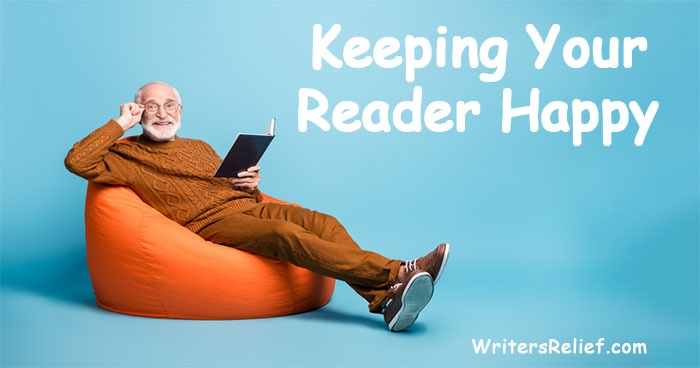
Updated August 2023
As much as writing is a part of our soul, our personal expression, when we’re trying to sell our creative writing, we must keep in mind that we’re writing for an audience. And today’s audience can be tough to please.
When editing or revising your short story, poem, novel, or essay, consider your reader. Is the piece wordy, confusing, or filled with sexist language? Do you overuse certain words or phrases? Do you tell rather than show? It’s worth a second look to make sure you’re keeping your reader interested and happy.
Five Things to Avoid:
1. Extraneous dialogue
“So, would you like to use our telephone?”
“Yes, please.”
“I’ll find it for you.”
“Thank you.”
“Oh, here it is.”
“Great.”
“Do you need a phone book?”
The trivial interchange above may be an extreme example, but it illustrates dialogue that does not influence the plot or define the characters. It provides nothing but filler, and it’s monotonous and meaningless.
What reader wants to relive all the trivial moments of life? Don’t we pick up creative writing in the hopes of being transported—riveted by new experiences and interesting characters? A great short story or poem can help us escape the mundane parts of our lives and experience a new point of view.
2. Wordiness
I, myself, have not decided what to do in the event that I don’t graduate this year. Perhaps I could utilize my parents’ connections to secure a job, like many individuals before me have done.
Today’s reading audience appreciates a straightforward read. They’re busy, and they want concise, economical language. Why use the word “utilize” when you can say “use”? Or “in the event of” when you can say “if”? And save the “myself” and “individuals” for police reports…
3. Sexually or racially biased language
The serving girl arrived with Cokes for the lady doctor and the Oriental gentleman.
Someone is bound to be offended by this sentence.
4. Shifting verb tenses
It had been awhile since Sarah saw Bruce, and she is in love with him. They will have been a couple for two years now if it weren’t for their three-month separation.
Confusing? Yes. Irritating? Extremely.
5. Comma splicing
There was a lovely fragrance in the air, she was so taken by the local flora that she vowed to make a stop at the garden center before leaving town.
Make these two separate sentences, or add a conjunction to join them. Please. (Also see Sentence Spoilers: Fragments and Run-on Sentences.)
Finally, keep your reader in mind at all times. Have others read your work, and consider their comments carefully. And if you need a second (or third) opinion, have one of the proofreaders at Writer’s Relief take a final look at your writing. We’re here to help!
REMEMBER TO CHECK OUT OUR LIST OF WRITING CONTESTS and ANTHOLOGIES! You won’t find a better list anywhere (AND IT’S FREE!) of upcoming anthologies, special-themed journals, and contests.

















Thanks for the writing tips.
Number 2 isn’t the rule. Some readers like it short and concise but they mostly read Vogue and snippets from the Economist. Or skimming through the pages of the latest book fashion on their iphones so they can quote it.
Economical language is good for business reports but not always for books.
Pretentious vocabulary and extravagant styles are bad and should be avoided, though.
ccpietri, thanks for your comment. Of course, you’re right: Number 2 is not the rule. We’re offering some general guidelines for writers to use, but there are always exceptions. Each writer needs to use his/her own best judgment when making those decisions. We were also trying to convey, not that sentences should be short in length but that they shouldn’t be “wordy” (too many unnecessary or repetitive words). Thank you for allowing us to clarify that; we don’t want anyone to think we’re saying that all sentences should be short and clipped. In fact, we think it’s usually good to have a mix of sentence lengths: Sentence Length: The Power Of Placing Periods.